Compilation of the 120 most common English vocabulary by topic
To achieve a B2 level of English, you need to master the 120 most common English vocabulary by topic. Right below, Prep has compiled a complete list of 120 English vocabulary categorized by topic and alphabetically, with a PDF download link for your reference!
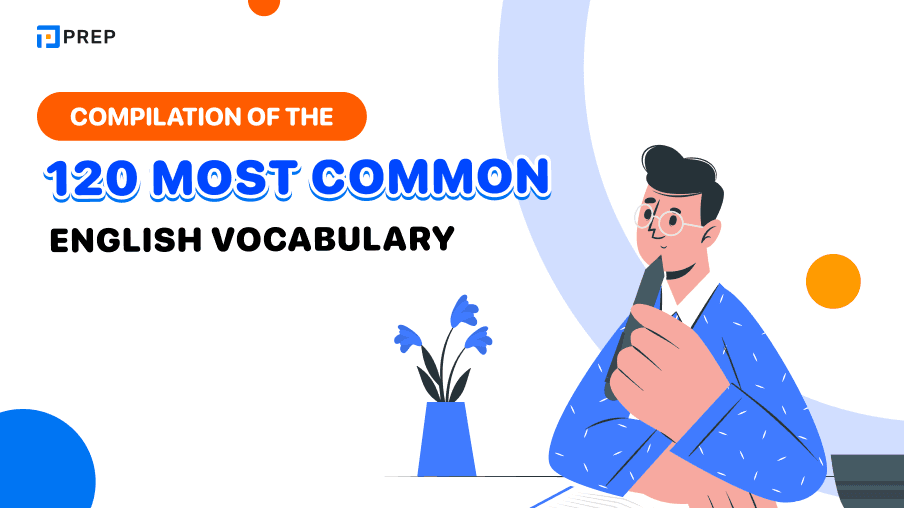
I. Compilation of 120 most common English vocabulary by topic
Below is the 120 most common English vocabulary categorized by topic, which you can save and start learning!
1. Food and Drinks
Let's take a look at some common vocabulary related to the topic of food and drinks below with PREP!
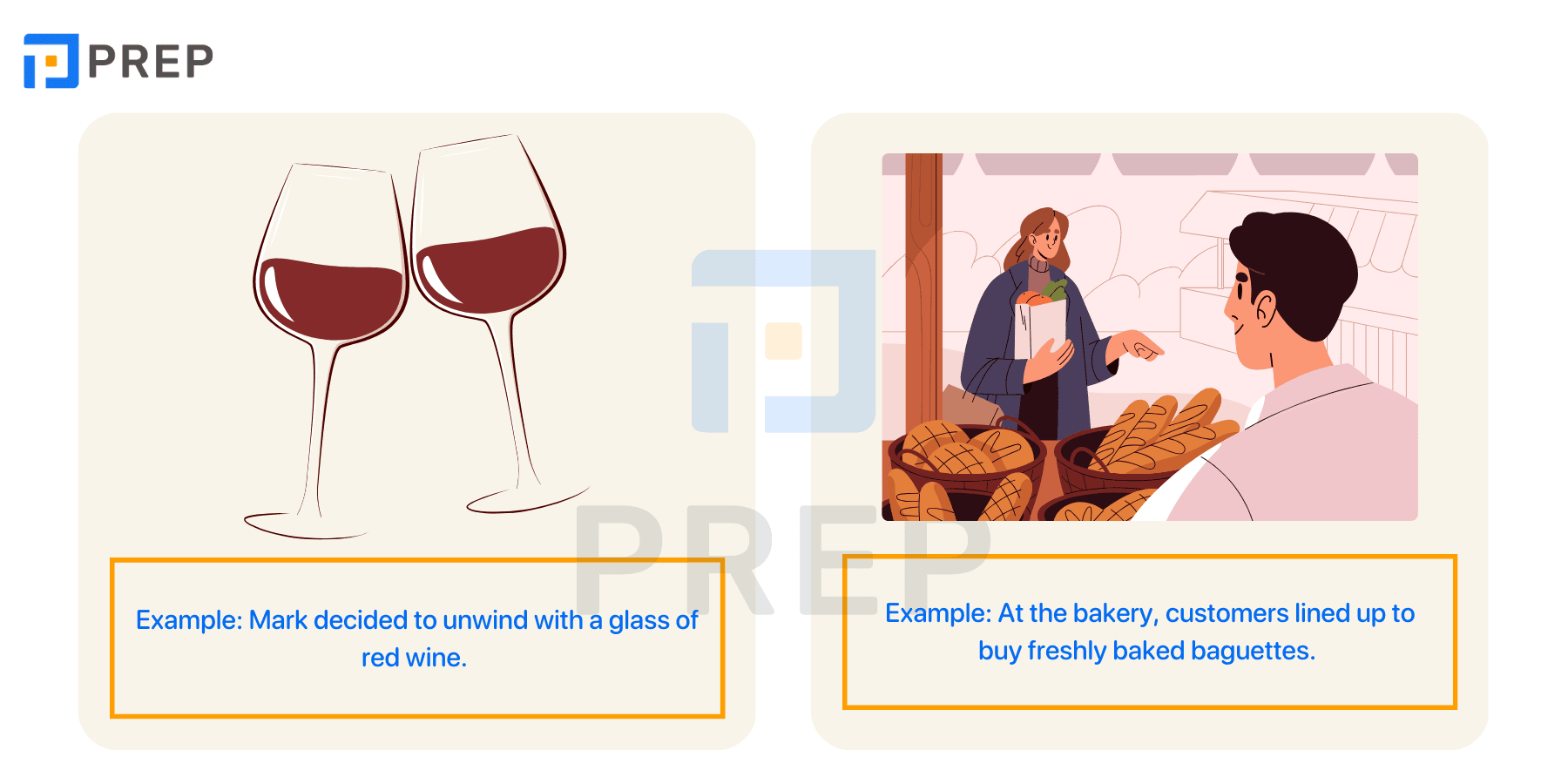
|
No. |
Food and Drinks Topic |
Meaning |
Example |
|
1 |
Wine /waɪn/ (n) |
an alcoholic drink that is usually made from grapes, but can also be made from other fruits or flowers. It is made by fermenting the fruit with water and sugar |
Mark decided to unwind with a glass of red wine. |
|
2 |
Baked potato /beɪk pəˈteɪtoʊ/ (n) |
a potato baked whole with its skin |
The restaurant served a perfectly baked potato with a crispy skin and a fluffy interior. |
|
3 |
Bacon /ˈbeɪ.kən/ (n) |
meat from the back or sides of a pig, often eaten fried in thin slices |
Sarah prepared sizzling bacon for her family. |
|
4 |
Baguette /bæɡˈet/ (n) |
a long, thin stick of white bread, of a type that originally came from France |
At the bakery, customers lined up to buy freshly baked baguettes. |
|
5 |
Beer /bɪr/ (n) |
an alcoholic drink made from grain and hops (= a type of plant) |
My friends open cold beers to enjoy with their grilled burgers and sausages. |
|
6 |
Bean /biːn/ (n) |
a seed, or the pod containing seeds, of various climbing plants, eaten as a vegetable |
In the vegetarian chili recipe, they use a variety of kidney beans and black beans. |
|
7 |
Biscuit /ˈbɪs.kɪt/ (n) |
a small, flat cake that is dry and usually sweet |
Maria enjoyed her afternoon tea with biscuits. |
|
8 |
Croissant /ˈkwæs.ɒ̃/ (n) |
a piece of light crescent-shaped pastry, usually eaten in the morning |
The aroma of freshly baked croissants wafted through the air as customers entered the bakery. |
|
9 |
Cheese /tʃiːz/ (n) |
a food made from milk, or from a milk-like substance taken from plants, that can be either firm or soft and is usually yellow or white in colour |
Some people dislike goat's cheese because they think it tastes too strong. |
|
10 |
Chicken nugget /ˈtʃɪkɪn ˈnʌɡɪt/ (n) |
a small piece of chicken that has been covered in breadcrumbs and fried |
The children eagerly dipped their chicken nuggets into tangy barbecue sauce. |
|
11 |
Chicken breast /ˈtʃɪkɪn brest/ (n) |
the meat from the front part of the body |
Grilled chicken breast, marinated in herbs and spices, was the centerpiece of the healthy dinner. |
|
12 |
Crab /kræb/ (n) |
a sea creature with five pairs of legs and a round, flat body covered by a shell, or its flesh eaten as food |
The seafood restaurant offered a sumptuous dish of crab legs. |
|
13 |
Coke /koʊk/ (n) |
Coca-Cola (= a brand name for a sweet, bubbly, brown drink that does not contain alcohol, or a glass of this drink) |
At the party, guests enjoyed sipping on ice-cold Coke while socializing and playing games. |
|
14 |
Chili sauce /ˈtʃɪli sɔːs/ (n) |
a spicy sauce made with chilli peppers and other ingredients such as tomatoes, vinegar, and spices |
The spicy chili sauce added a kick to the stir-fried noodles. |
|
15 |
Crepe /kreɪp/ (n) |
a thin, light pancake |
The street vendor skillfully flipped a delicate crepe. |
|
16 |
Juice /dʒuːs/ = squash /skwɑːʃ/ (n) |
the liquid that comes from fruit or vegetables |
Freshly squeezed orange juice was a popular choice for breakfast at the juice bar. |
|
17 |
Fried chicken /fraɪd ˈtʃɪk.ɪn/ (n) |
a dish consisting of chicken pieces that have been coated with seasoned flour or batter and pan-fried, deep fried, pressure fried, or air fried |
The crispy coating on the fried chicken made it a favorite among the diners. |
|
18 |
Hotdog /ˈhɒt.dɒɡ/ (n) |
a dish consisting of a grilled, steamed, or boiled sausage served in the slit of a partially sliced bun |
At the baseball game, spectators enjoyed classic hotdogs loaded. |
|
19 |
Milk /mɪlk/ (n) |
the white liquid produced by cows, goats, and sheep and used by humans as a drink or for making butter, cheese, etc. |
The children sipped on cold glasses of milk, pairing it with warm chocolate chip cookies for an afternoon treat. |
|
20 |
Noodle /ˈnuː.dəl/ (n) |
a food in the form of long, thin strips made from flour or rice, water, and often egg, cooked in boiling liquid |
The aromatic bowl of noodle soup, garnished with fresh herbs, was a comforting meal on a chilly evening. |
2. Transportation
Let's pocket some common vocabulary related to the topic of transportation below with PREP!
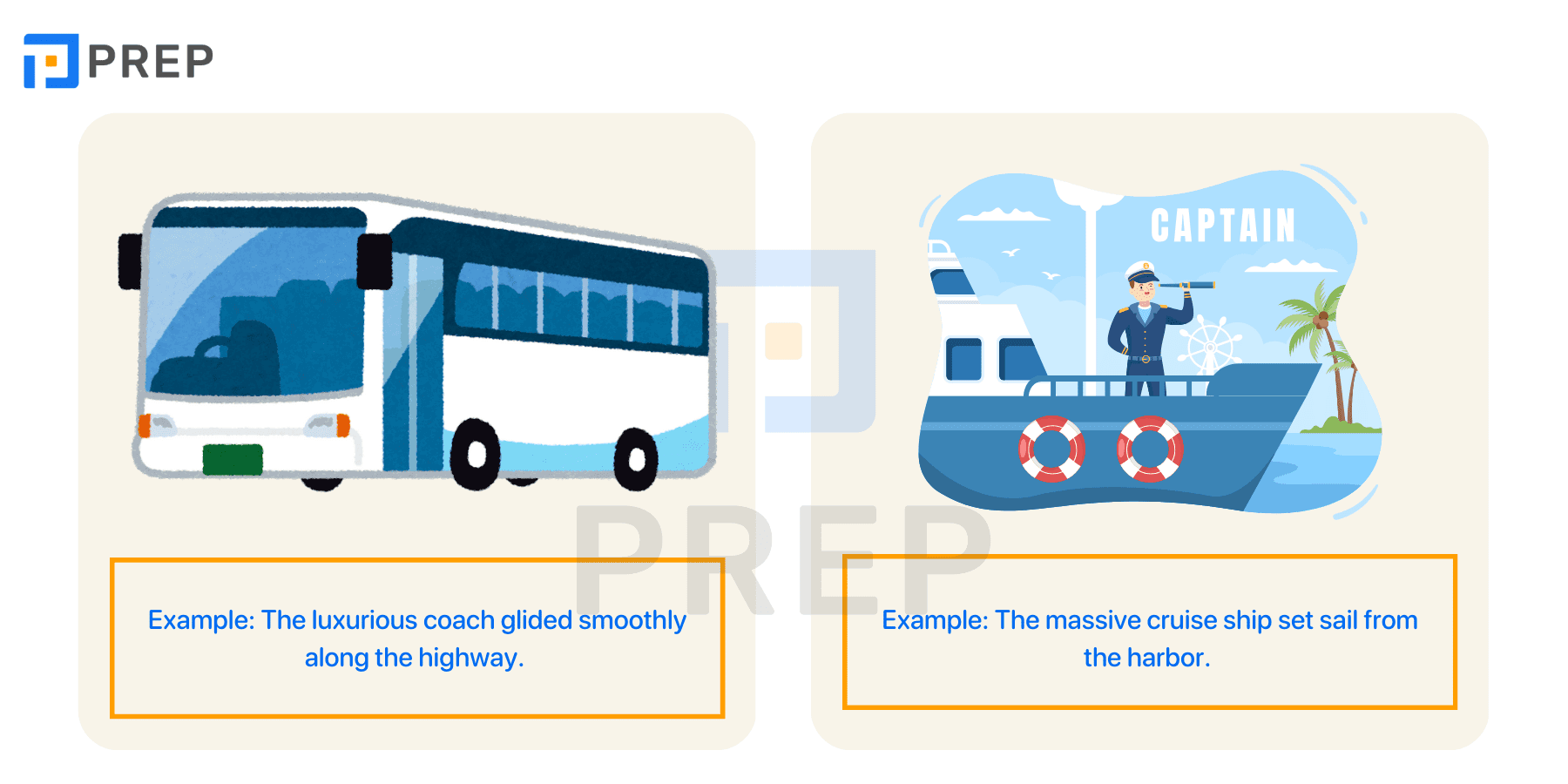
|
No. |
Transportation Topic |
Meaning |
Example |
|
1 |
Subway /ˈsʌbweɪ/ (n) |
a railway system in which electric trains travel through tunnels below ground |
Commuters in the city prefer taking the subway to avoid traffic congestion. |
|
2 |
Coach /kəʊtʃ/ (n) |
a long motor vehicle with comfortable seats, used to take groups of people on journeys |
The luxurious coach glided smoothly along the highway. |
|
3 |
Bicycle /ˈbaɪ.sɪ.kəl/ (n) |
a two-wheeled vehicle that you sit on and move by turning the two pedals (= flat parts you press with your feet) |
Sara decided to commute to work by bicycle. |
|
4 |
Motorbike /ˈməʊ.tə.baɪk/ (n) |
a road vehicle with two wheels, driven by an engine, with one seat for the driver and often a seat for a passenger behind the driver |
The roar of a motorbike echoed through the streets. |
|
5 |
Truck /trək/ (n) |
a large road vehicle that is used for transporting large amounts of goods |
The delivery truck rumbled down the narrow lane. |
|
6 |
Bus /bəs/ (n) |
a large vehicle in which people are driven from one place to another |
The crowded bus stopped at the intersection. |
|
7 |
Ship /ʃɪp/ (n) |
a large boat for travelling on water, especially across the sea |
The massive cruise ship set sail from the harbor. |
|
8 |
Airplane /ˈeəpleɪn/ (n) |
a vehicle designed for air travel that has wings and one or more engines |
Passengers settled into their seats as the airplane taxied down the runway, preparing for takeoff. |
|
9 |
Road sign /roʊd saɪn/ (n) |
signs erected at the side of or above roads to give instructions or provide information to road users |
The road sign indicated a sharp turn ahead, prompting drivers to reduce speed. |
|
10 |
Pedestrian crossing /pɪˈdɛstrɪən ˈkrɒsɪŋ/ (n) |
a special place in a road where traffic must stop to allow people to walk across |
At the pedestrian crossing, people patiently waited for the traffic signal to change before crossing the street. |
|
11 |
Traffic jam /ˈtrafik ˌjam/ (n) |
a large number of vehicles close together and unable to move or moving very slowly |
Frustrated drivers honked their horns as they found themselves stuck in a lengthy traffic jam during rush hour. |
|
12 |
Two-way traffic /ˌtuː ˈweɪ ˈtræfɪk/ (n) |
moving or allowing movement in both directions |
The narrow bridge allowed for two-way traffic, with cars carefully passing each other in opposite directions. |
|
13 |
Motorcycle lane /ˈməʊtəˈsaɪkl leɪn/ (n) |
a part of a road that is separated by a line from the rest of the road, for the use of people riding motorbikes |
Motorcyclists zipped through the dedicated motorcycle lane, avoiding congestion on the main road. |
|
14 |
Highway /ˈhaɪweɪ/ (n) |
a public road, especially an important road that joins cities or towns together |
The highway stretched for miles, connecting cities. |
|
15 |
Car park /kɑːr pɑːrk/ (n) |
an area of ground for parking cars |
The shopping mall's underground car park provided ample space for visitors to park their vehicles. |
3. Weather
Let's refer to some common vocabulary related to the topic of weather below, with PREP!
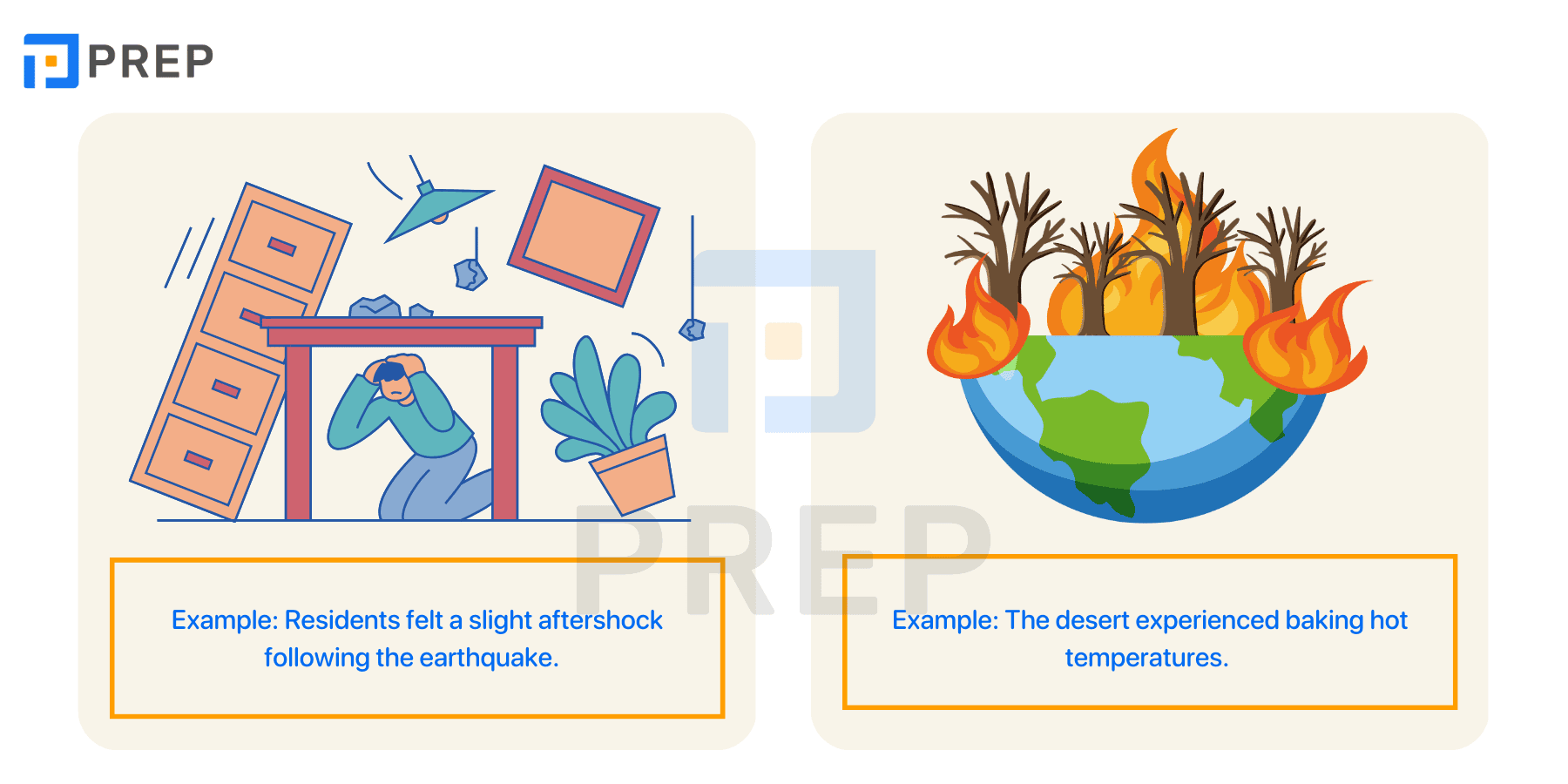
|
No. |
Weather Topic |
Meaning |
Example |
|
1 |
Aftershock /’ɑ:ftə∫ɔk/ (n) |
a sudden movement of the earth's surface that often follows an earthquake and is less violent than the first main movement |
Residents felt a slight aftershock following the earthquake. |
|
2 |
Avalanche /’ævəlɑ:n∫/ (n) |
a large amount of ice, snow, and rock falling quickly down the side of a mountain |
The mountain rescue team issued a warning about the risk of avalanches. |
|
3 |
Breeze /bri:z/ (n) |
a light and pleasant wind |
The leaves on the trees rustled in the gentle breeze. |
|
4 |
Blizzard /’blizəd/ (n) |
a severe snow storm with strong winds |
During the blizzard, visibility dropped to almost zero. |
|
5 |
Baking hot /beɪk hɑːt/ (adj) |
very hot |
The desert experienced baking hot temperatures. |
|
6 |
Cold /koʊld/ (adj) |
at a low temperature, especially when compared to the temperature of the human body, and not hot, or warm |
Despite wearing layers, Emily shivered in the cold wind. |
|
7 |
Celsius /ˈselsiəs/ (n) |
(of) a measurement of temperature on a standard in which 0° is the temperature at which water freezes, and 100° the temperature at which it boils |
The weather forecast predicted temperatures in Celsius. |
|
8 |
Chilly /ˈtʃɪli/ (adj) |
(of weather, conditions in a room, or parts of the body) cold |
The morning was chilly, with a crisp breeze. |
|
9 |
Clear /kliə[r]/ (adj) |
easy to understand, hear, read, or see |
The sky was clear. |
|
10 |
Damp /dæmp/ (n) |
slightly wet, especially in a way that is not pleasant or comfortable |
The grass is still damp. |
|
11 |
Drizzle /’drizl/ (n) |
rain in very small, light drops |
A light drizzle began, creating a fine mist. |
|
12 |
Dry /drai/ (adj) |
used to describe something that has no water or other liquid in, on, or around it |
The arid region experienced an extended period of dry weather. |
|
13 |
Freezing /'fri:ziɳ/ (adj) |
extremely cold |
The temperature dropped below freezing. |
|
14 |
Flood /flʌd/ (n) |
to cause to fill or become covered with water, especially in a way that causes problems |
Heavy rains resulted in a flood that submerged low-lying areas. |
|
15 |
Gloomy /’glu:mi/ (adj) |
dark in a way that is unpleasant and makes it difficult to see |
The gloomy sky and persistent rain cast a somber atmosphere over the town. |
4. Emotions/Feelings
Let's see some common vocabulary related to the topic of emotions/feelings below with PREP!
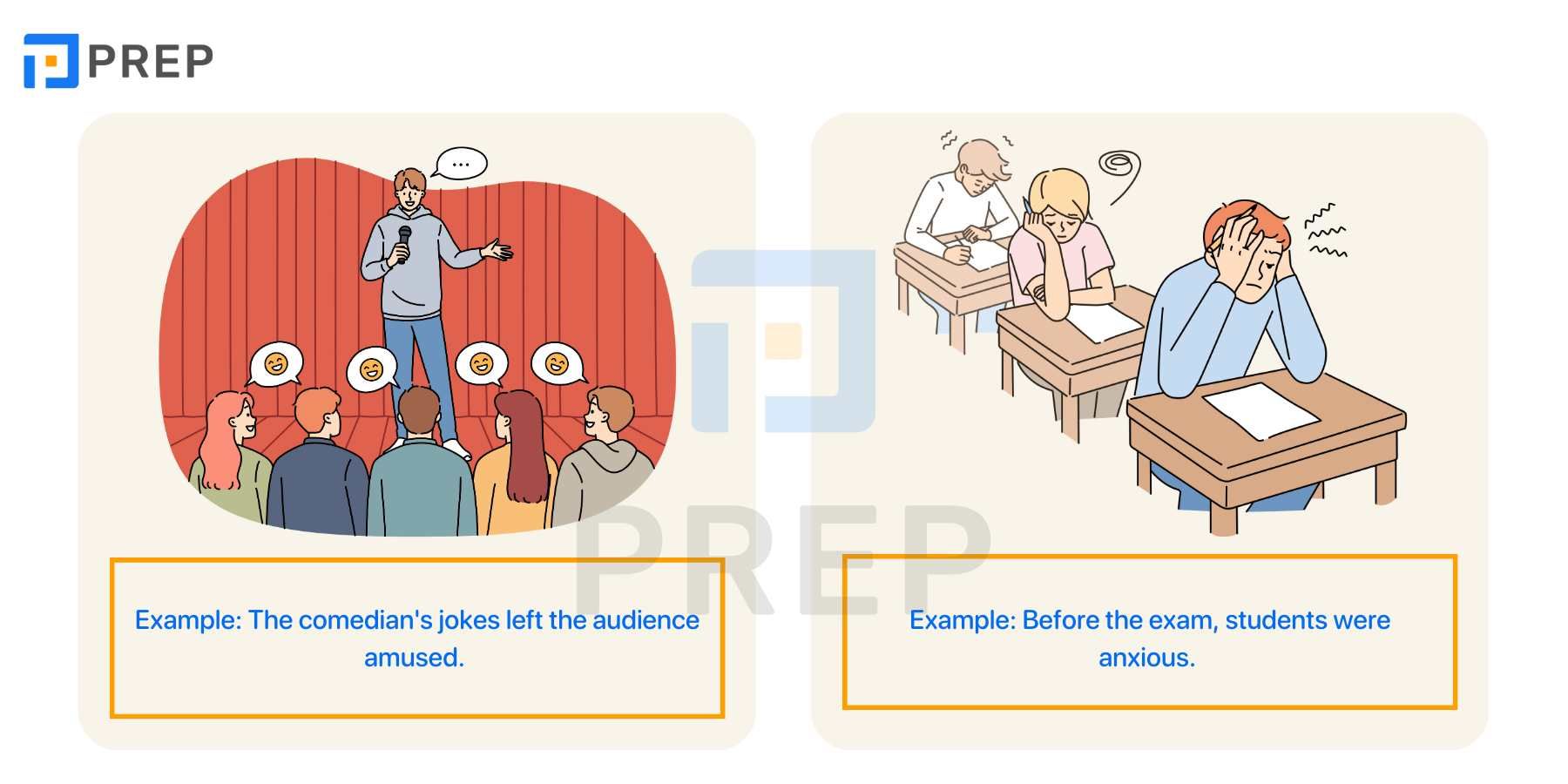
|
No. |
Emotions/ Feelings Topic |
Meaning |
Example |
|
1 |
Amused /ə’mju:zd/ (adj) |
showing that you think something is funny |
The comedian's jokes left the audience amused. |
|
2 |
Afraid /əˈfreɪd/ (adj) |
feeling fear, or feeling worry about the possible results of a particular situation |
Sarah felt afraid when she heard strange noises coming from the dark alley. |
|
3 |
Angry /ˈæŋgri/ (adj) |
having a strong feeling against someone who has behaved badly, making you want to shout at them or hurt them |
James became angry when he discovered that someone had changed his computer settings. |
|
4 |
Anxious /ˈæŋkʃəs/ (adj) |
worried and nervous |
Before the exam, students were anxious. |
|
5 |
Annoyed /əˈnɔɪd/ (adj) |
to make someone angry |
Maria was annoyed by the noise from the construction site. |
|
6 |
Ashamed /əˈʃeɪmd/ (adj) |
feeling guilty or embarrassed about something you have done or about a quality in your character |
After the mistake at work, John felt ashamed. |
|
7 |
Bewildered /bɪˈwɪldəd/ (adj) |
confused and uncertain |
The complicated instructions left the new employee bewildered. |
|
8 |
Bored /bɔrd/ (adj) |
feeling unhappy because something is not interesting or because you have nothing to do, or showing that you feel like this |
The lecture was so dull that many students looked bored. |
|
9 |
Confident /ˈkɒnfɪdənt/ (adj) |
being certain of your abilities or having trust in people, plans, or the future |
Despite the challenges, Emily remained confident that she could successfully complete the project. |
|
10 |
Confused /kənˈfjuzd/ (adj) |
unable to think clearly or to understand something |
The complex puzzle left the participants confused. |
|
11 |
Delighted /dɪˈlaɪtɪd/ (adj) |
very pleased |
The children were delighted when they received unexpected gifts on their birthdays. |
|
12 |
Disappointed /ˌdɪsəˈpɔɪntɪd/ (adj) |
unhappy because someone or something was not as good as you hoped or expected, or because something did not happen |
Tom felt disappointed when his favorite team lost the championship game. |
|
13 |
Disgusted /dɪsˈgʌstɪd/ (n) |
feeling extreme dislike or disapproval of something |
The spoiled food in the refrigerator left a disgusting odor. |
|
14 |
Ecstatic /ɪkˈstætɪk/ (adj) |
extremely happy |
Winning the lottery made Mark ecstatic, and he couldn't believe his good fortune. |
|
15 |
Embarrassed /ɪmˈbɛrəst/ (adj) |
feeling ashamed or shy |
Emma was embarrassed when she realized she had been talking loudly on the phone in a quiet library. |
5. Shopping
In the 120 most common English vocabulary related to the topic of shopping, you need to remember the following basic words:

|
No. |
Shopping Topic |
Meaning |
Example |
|
1 |
Shop /ˈʃɒp/ (v) |
to buy things in shops |
I like shopping on weekends. |
|
2 |
Retail /ˈriː.teɪl/ |
the activity of selling goods to the public, usually in shops |
Retail stores are more expensive than dealers. |
|
3 |
Mall /mɔːl/ (n) |
a large, usually covered, shopping area where cars are not allowed |
Shopping malls are usually very crowded. |
|
4 |
Store /stɔːr/ (n) |
a large shop where you can buy many different types of goods |
I stopped by the shoe store to pick up a pair. |
|
5 |
Customer /ˈkʌs.tə.mər/ (n) |
a person who buys goods or a service |
The customer is the one who pays you. |
|
6 |
Sale /seɪl/ (n) |
an act of exchanging something for money |
This store is on sale. |
|
7 |
Discount /ˈdɪs.kaʊnt/ (n) |
a reduction in the usual price |
I got a 30% discount with this order. |
|
8 |
Purchase /ˈpɜː.tʃəs/ (v) |
to buy something |
I have a habit of purchasing cheap goods. |
|
9 |
Payment /ˈpeɪ.mənt/ (n) |
an amount of money paid |
Payment methods are very diverse. |
|
10 |
Receipt /rɪˈsiːt/ (n) |
something such as a piece of paper or message proving that money, goods, or information have been received |
I would like to receive a receipt. |
6. Colors
Regarding the topic of colors, in the 120 most common English vocabulary, you need to remember the following words:
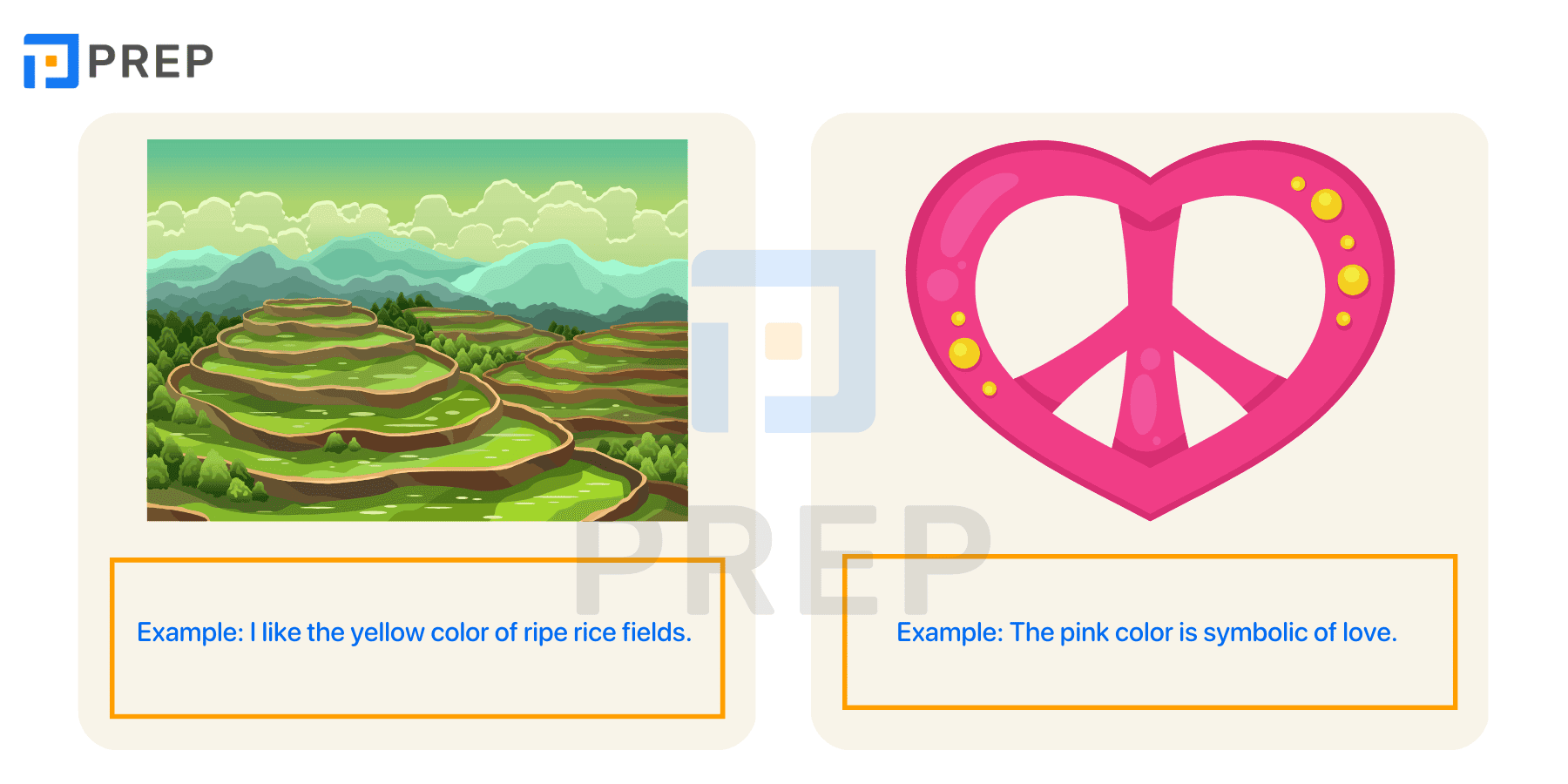
|
No. |
Colors Topic |
Meaning |
Example |
|
1 |
Color /ˈkʌl.ər/ (n) |
a substance, such as a paint or dye, which you add to something to make it have the appearance of a particular color. |
Color makes the wall stand out. |
|
2 |
Red /red/ (n) |
of the color of fresh blood |
Red represents the color of blood. |
|
3 |
Blue /bluː/ (n) |
of the color of the sky without clouds on a bright day, or a darker or lighter type of this |
Blue gives a cool feeling. |
|
4 |
Green /ɡriːn/ (n) |
of a color between blue and yellow; of the color of grass |
Green is symbolic of summer. |
|
5 |
Yellow /ˈjel.oʊ/ (n) |
a color like that of a lemon or gold or the sun |
I like the yellow color of ripe rice fields. |
|
6 |
Orange /ˈɔːr.ɪndʒ/ (n) |
a color between red and yellow |
I have an orange bag. |
|
7 |
Pink /pɪŋk/ (n) |
a pale red color |
The pink color is symbolic of love. |
|
8 |
Purple /ˈpɜːr.pəl/ (n) |
a dark reddish-blue color |
Purple is a symbol of fidelity. |
|
9 |
Brown /braʊn/ (n) |
the color of chocolate or soil |
Brown gives an antique feel. |
|
10 |
Black /blæk/ (n) |
the color of coal or of the sky on a very dark night |
Black is a masculine color. |
|
11 |
White /waɪt/ (n) |
a color like that of snow, milk, or bone |
White is easy to get dirty. |
7. Sports
In the 120 most common English vocabulary related to the topic of sports, here are some basic words:
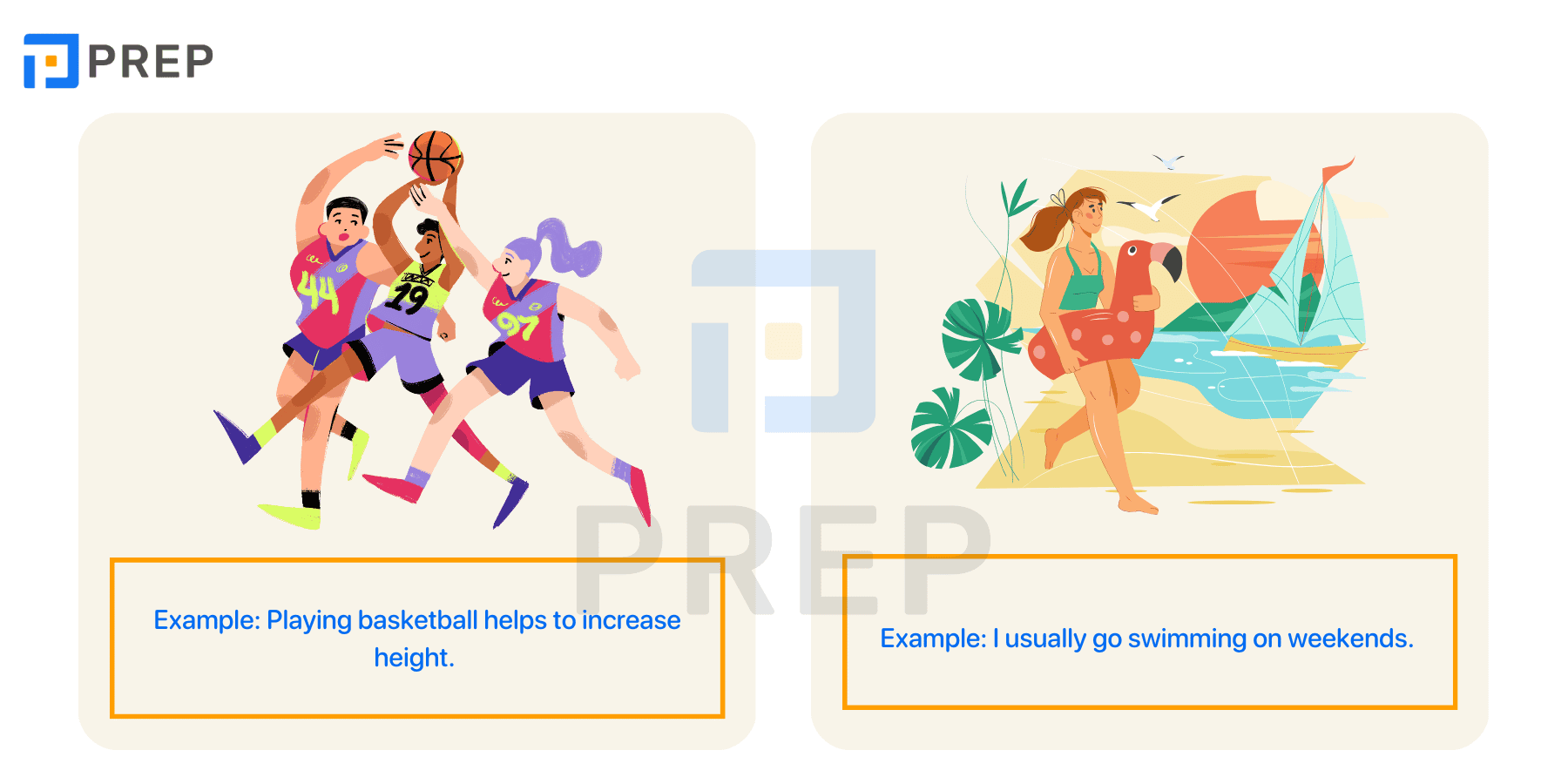
|
No. |
Sports Topic |
Meaning |
Example |
|
1 |
Sport /spɔːrt/ (n) |
a game, competition, or activity needing physical effort and skill that is played or done according to rules, for enjoyment and/or as a job |
My boyfriend loves to play sports. |
|
2 |
Football /ˈfʊt.bɔːl/ (n) |
a game played between two teams of eleven people, where each team tries to win by kicking a ball into the other team's goal |
Football is the king sport. |
|
3 |
Basketball /ˈbæs.kɪt.bɔːl/ (n) |
a game played by two teams of five players who score points by throwing a large ball through an open net hanging from a metal ring |
Playing basketball helps to increase height. |
|
4 |
Tennis /ˈten.ɪs/ (n) |
a game played between two or four people on a special playing area that involves hitting a small ball across a central net using a racket |
Tennis is a sport that requires agility. |
|
5 |
Swimming /ˈswɪm.ɪŋ/ (n) |
the sport or activity of propelling oneself through water using the limbs |
I usually go swimming on weekends. |
|
6 |
Running /ˈrʌn.ɪŋ/ (n) |
the activity of going somewhere quickly on foot, as a sport or for pleasure |
Running helps to lose weight. |
|
7 |
Cycling /ˈsaɪ.kəl.ɪŋ/ (n) |
the sport of riding a bicycle |
I'm going to get up early to go cycling this weekend. |
|
8 |
Gymnastics /dʒɪmˈnæs.tɪks/ (n) |
physical exercises and activities performed inside, often using equipment such as bars and ropes, intended to increase the body's strength and the ability to move and bend easily |
Gymnastics requires the guidance of a coach. |
|
9 |
Volleyball /ˈvɒl.i.bɔːl/ (n) |
a game in which two teams use their hands to hit a large ball backwards and forwards over a high net without allowing the ball to touch the ground |
Volleyball is my school's main sport. |
8. Environment
In the 120 most common English vocabulary related to the topic of the environment, you need to remember some basic words:
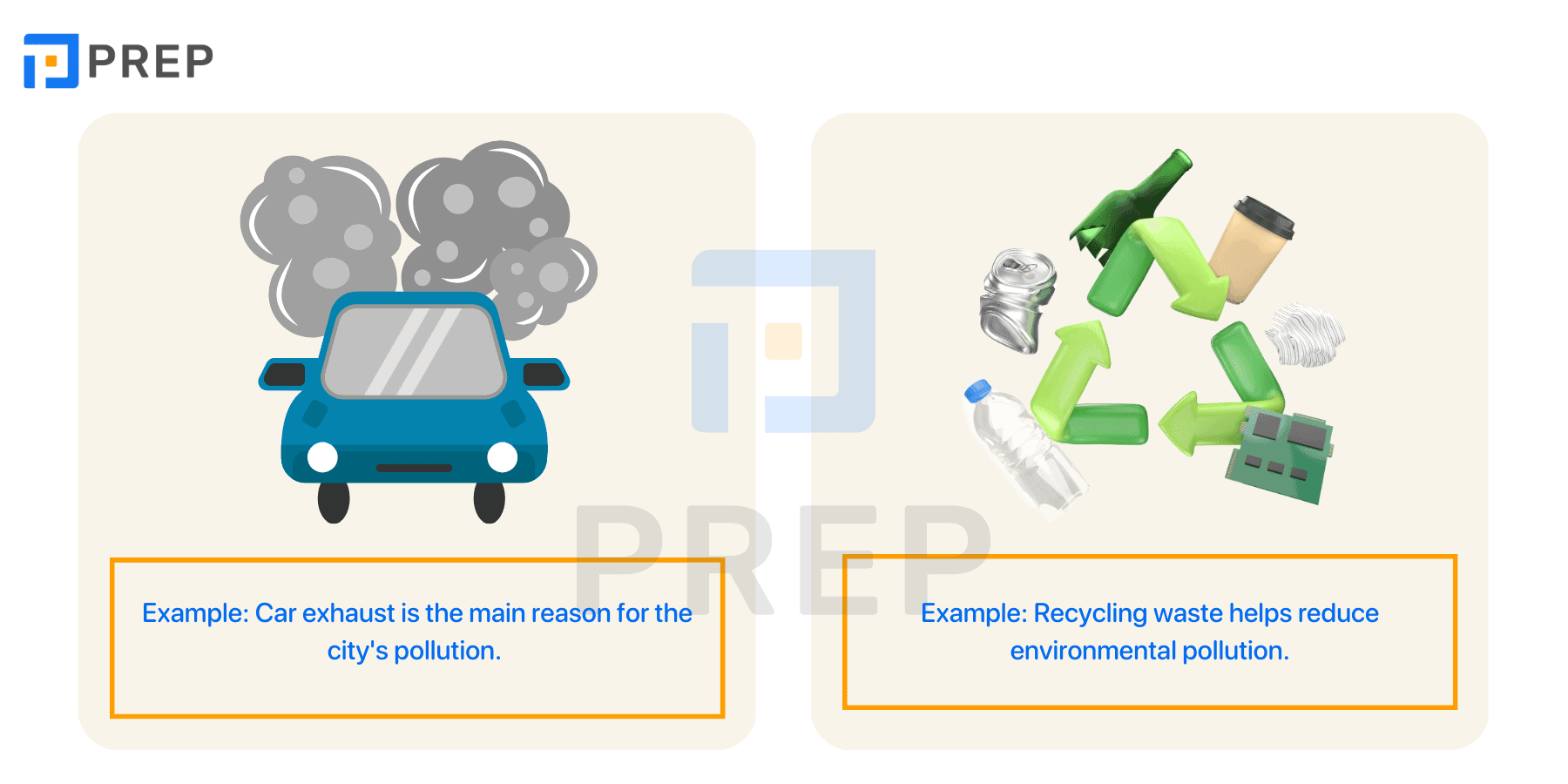
|
No. |
Environment Topic |
Meaning |
Example |
|
1 |
Environment /ɪnˈvaɪ.rən.mənt/ (n) |
the air, water, and land in or on which people, animals, and plants live |
Please protect the environment because that is also protecting yourself. |
|
2 |
Pollution /pəˈluː.ʃən/ (n) |
damage caused to water, air, etc. by harmful substances or waste |
Car exhaust is the main reason for the city's pollution. |
|
3 |
Climate /ˈklaɪ.mət/ (n) |
the general weather conditions usually found in a particular place |
The climate is cooler in the east of the country. |
|
4 |
Conservation /ˌkɒn.səˈveɪ.ʃən/ (n) |
the protection of plants and animals, natural areas, and interesting and important structures and buildings, especially from the damaging effects of human activity |
Animal conservation is something we need to do together. |
|
5 |
Recycle /ˌriːˈsaɪ.kəl/ (v) |
to sort and collect rubbish in order to treat it and produce useful materials that can be used again |
Recycling waste helps reduce environmental pollution. |
|
6 |
Ecosystem /ˈiː.koʊ.sɪs.təm/ (n) |
all the living things in an area and the way they affect each other and the environment |
Forest ecosystems are being destroyed. |
|
7 |
Biodiversity /ˌbaɪ.oʊ.daɪˈvɜːr.sə.ti/ (n) |
the number and types of plants and animals that exist in a particular area or in the world generally, or the problem of protecting this |
Learning about biodiversity is very interesting. |
|
8 |
Deforestation /ˌdiː.fɒr.ɪˈsteɪ.ʃən/ (n) |
the cutting down of trees in a large area, or the destruction of forests by people |
Deforestation causes many animals to die. |
9. Animals
In the 120 most common English vocabulary related to the topic of animals, you need to grasp the following basic words:
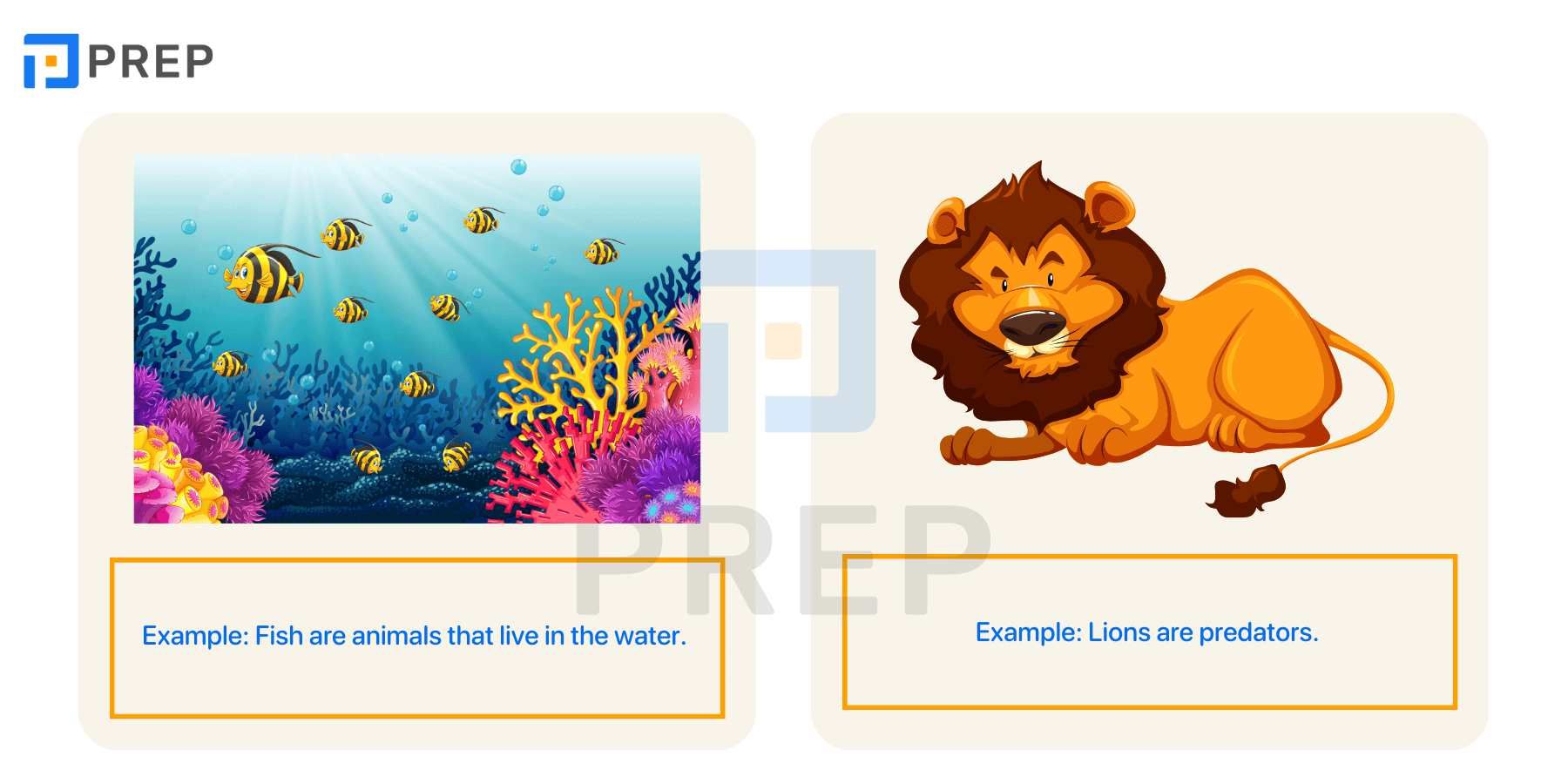
|
No. |
Animals Topic |
Meaning |
Example |
|
1 |
Animal /ˈæn.ɪ.məl/ (n) |
something that lives and moves but is not a human, bird, fish, or insect |
Please protect animals. |
|
2 |
Mammal /ˈmæm.əl/ (n) |
any animal of which the female feeds her young on milk from her own body. Most mammals give birth to live young, not eggs. |
Kangaroos are mammals. |
|
3 |
Bird /bɜːrd/ (n) |
a creature with feathers and wings, usually able to fly |
I have 3 birds. |
|
4 |
Fish /fɪʃ/ (n) |
an animal that lives in water, is covered with scales, and breathes by taking water in through its mouth, or the flesh of these animals eaten as food |
Fish are animals that live in the water. |
|
5 |
Reptile /ˈrep.taɪl/ (n) |
an animal that produces eggs and uses the heat of the sun to keep its blood warm |
Snakes are reptiles. |
|
6 |
Amphibian /æmˈfɪb.i.ən/ (n) |
an animal, such as a frog, that lives both on land and in water but must produce its eggs in water |
Frogs are amphibians. |
|
7 |
Insect /ˈɪn.sekt/ (n) |
a type of very small animal with six legs, a body divided into three parts and usually two pairs of wings, or, more generally, any similar very small animal |
Insects are invertebrates. |
|
8 |
Predator /ˈpred.ə.tər/ (n) |
an animal that hunts, kills, and eats other animals |
Lions are predators. |
|
9 |
Pet /pet/ (n) |
an animal that is kept in the home as a companion and treated kindly |
Cats are my pets. |
10. Information Technology
In the 120 most common English vocabulary related to the topic of information technology, you need to grasp the following basic words:
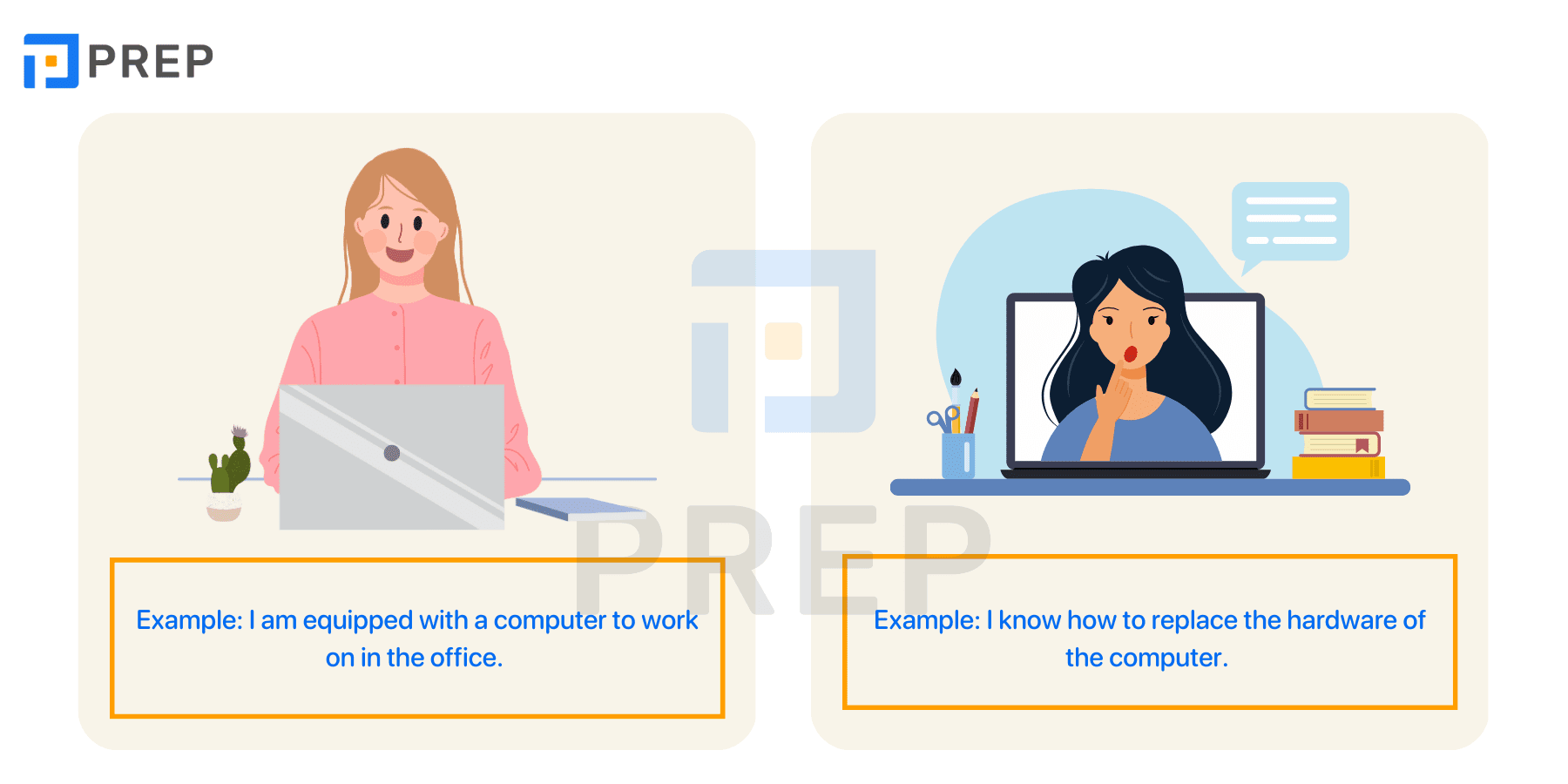
|
No. |
Information Technology Topic
|
Meaning |
Example |
|
1 |
Technology /tekˈnɒl.ə.dʒi/ (n) |
(the study and knowledge of) the practical, especially industrial, use of scientific discoveries |
My boyfriend works in the field of information technology. |
|
2 |
Computer /kəmˈpjuː.tər/ (n) |
an electronic machine that is used for storing, organizing, and finding words, numbers, and pictures, for doing calculations, and for controlling other machines |
I am equipped with a computer to work on in the office. |
|
3 |
Software /ˈsɒft.weər/ (n) |
the instructions that control what a computer does; computer programs |
I am a software programmer. |
|
4 |
Hardware /ˈhɑːd.weər/ (n) |
the physical and electronic parts of a computer, rather than the instructions it follows |
I know how to replace the hardware of the computer. |
|
5 |
Internet /ˈɪn.tə.net/ (n) |
the large system of connected computers around the world that allows people to share information and communicate with each other |
The device requires an internet connection to access the application. |
|
6 |
Website /ˈweb.saɪt/ (n) |
a set of pages of information on the internet about a particular subject, published by a single person or organization |
I am managing two websites. |
|
7 |
Database /ˈdeɪ.tə.beɪs/ (n) |
a large amount of information stored in a computer system in such a way that it can be easily looked at or changed |
A database is a place where data is stored in a programming system. |
|
8 |
Programming /ˈproʊ.ɡræm.ɪŋ/ (n) |
the activity or job of writing computer programs |
This programming system has secure security. |
|
9 |
Algorithm /ˈæl.ɡə.rɪðəm/ (n) |
a set of mathematical instructions or rules that, especially if given to a computer, will help to calculate an answer to a problem |
You need to learn about algorithms when you start programming. |
|
10 |
Cybersecurity /ˈsaɪ.bər.sɪˌkjʊr.ə.ti/ (n) |
things that are done to protect a person, organization, or country and their computer information against crime or attacks carried out using the internet |
Cybersecurity laws are very strict. |
II. Effective methods to learn 120 most common English vocabulary
To effectively learn the 120 most common English vocabulary, you can apply the following methods:
1. Application and avoidance of word death
Try to apply the 120 most common English vocabulary in real-life situations and contexts, such as in daily communication or in your studies, to prevent the words from becoming stagnant. You can practice naming objects and phenomena around you using English vocabulary. Alternatively, you can create situations and topics to practice speaking every day. Additionally, an effective way to learn vocabulary is by writing a daily journal in English.
2. Spaced repetition
Spaced repetition is an effective method to learn vocabulary that you should adopt. With this learning method, you can plan the appropriate number of new words to learn and review old words.
For example, on the second day, learn 5 new words; on the third day, learn 10 new words; on the fourth day, review the 5 words from the second day and the 5 words from the third day. In the first month of familiarizing yourself with this vocabulary learning method, you can start by learning only 5 words per day. However, in the second month, you can increase it to 10 words per day.
3. Thematic learning and mind mapping
Learning vocabulary by themes helps you to have a holistic understanding and better connections between words. You can study according to the main themes mentioned above, and combine it with mind mapping to ensure a comprehensive and easier-to-remember approach.
You can divide the 120 most common English vocabulary into themes such as food, transportation, weather, etc., and then create mind maps for each theme.
For example, for the topic of clothing, you can refer to the basic mind map below:
4. Learn vocabulary with PREP
PREP offers vocabulary courses ranging from basic to advanced levels, suitable for different learning paths and proficiency levels. PREP's vocabulary courses not only cover diverse topics but also provide effective learning methods. The content of PREP's vocabulary courses includes:
|
Course |
Content |
|
Basic vocabulary |
10 lessons covering 10 main topics: Introduction, Natural World, Daily Activities, Family, Interior Design, Health, Student Life, Leisure Time, Work and Colleagues, Technology. |
|
Intermediate vocabulary |
17 lessons covering vocabulary topics such as appearance, personality and social relationships, events and celebrations, homes, weather and climate, emotions and opinions, shopping, food and drinks, health, arts and sports, work, education, films and media, places and transportation. |
|
Advanced vocabulary |
18 lessons including lectures on effective vocabulary learning methods, topics related to relationships in life, dining, entertainment, cultural tourism, construction and housing, social media, politics and war, crimes and punishments, education, environment and related issues, science and technology, professions and economy, infrastructure. |
This article is a compilation of the 120 most common English vocabulary organized by basic themes that you should familiarize yourself with when starting to learn English. PREP hopes that you can apply suitable learning methods to enhance your learning effectiveness!

Hi I'm Chloe, and I am currently serving as an Product Content Administrator at Prep Education. With over five years of experience in independent online IELTS study and exam preparation, I am confident in my ability to support learners in achieving their highest possible scores.
Comment
Premium content
View allPersonalized roadmap
Most read












